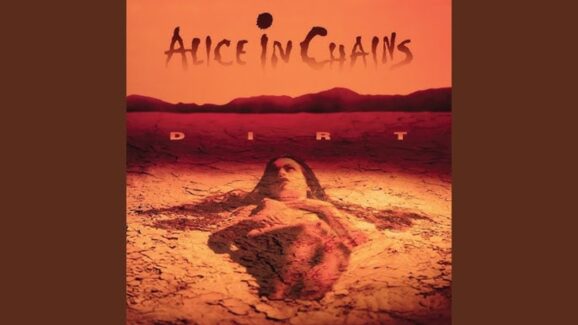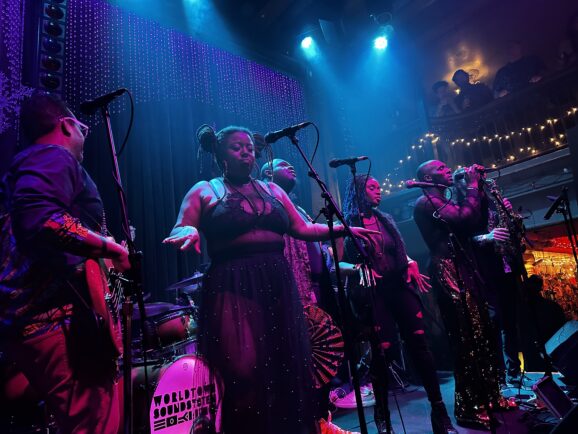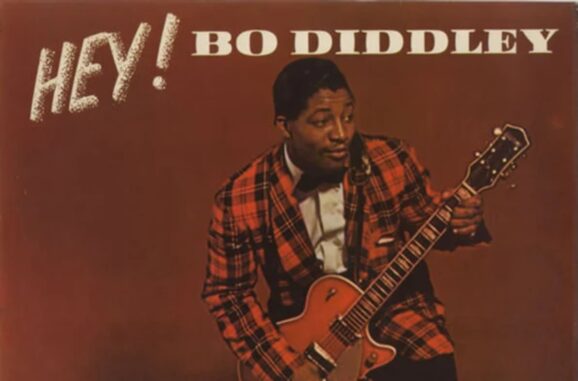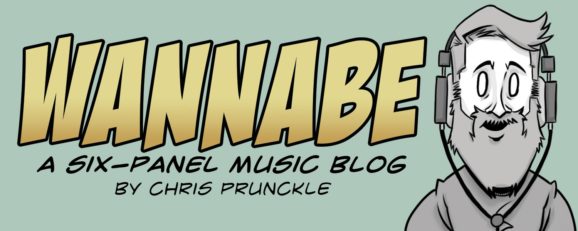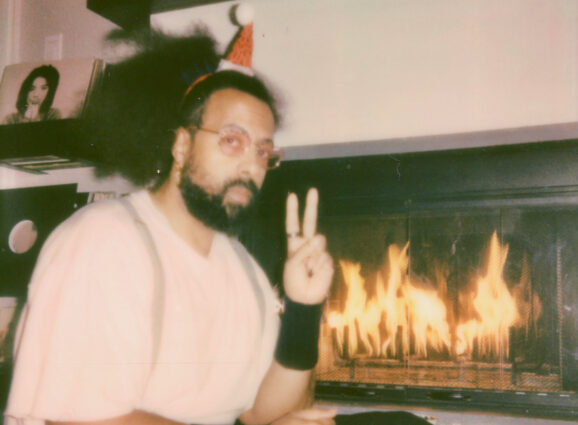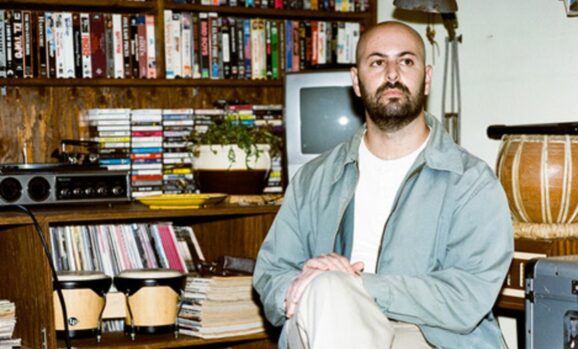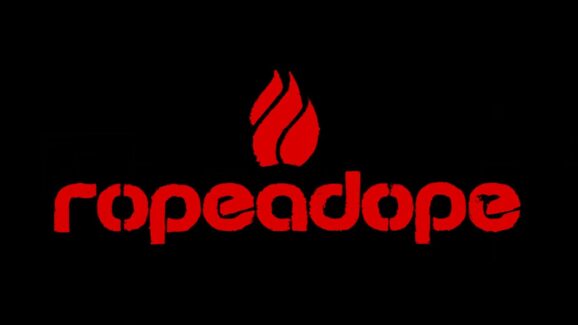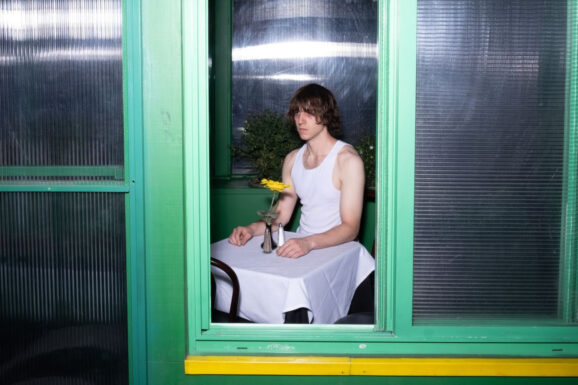Left For Dead Records has issued a significant archival release gathering the music of early to mid-80s New Jersey Hardcore Punk band Detention. While the group only spanned a few years, they nevertheless captured a nationwide surge in genre-pushing and often satirical music that influenced other bands, particularly through their rowdy and theatrical live shows. The release, titled Dead Rock ‘N Rollers, features nine tracks, among them their regional hit track by the same name. Other songs include cuts from their self-titled debut album and unreleased material, and it has been issued on CD and limited edition 12-inch vinyl in black and coke bottle clear.
For Kevin Shields, who returned from a whirlwind tour of the country as a young person in the Coast Guard to found the band and is currently the main band member left to carry its legacy, holding the physical release of the music in his hands has been very emotional. It reminds him of a time of fomenting creativity when he and his bandmates brought all their crazy ideas to their songs and their live shows and were met with a lot of support from the zeitgeist. I spoke with Kevin Shields about his formative experiences and his reflections on the making of this music as part of a diverse national scene.
Does this release feel like a consolidation of the band’s legacy for you, preserving its history?
Well, I’m literally the last man standing here, because my brother, the singer, passed in 2021. Leukemia got him. Our guitar player bought the farm last year due to untreated alcoholism, basically. My younger brother, the drummer, is basically on disability. The original guitarist, Rodney, is not someone I’ve spoken to in 30 years. I don’t play music anymore, though I enjoy listening to it, and will go to live music occasionally.
I’m so sorry to hear that. That makes this release even more poignant and, I think, significant.
It’s amazing to get this thing in my hands. I had to work with James Reynolds, from Left for Dead, to send him information, which was eventually put on the album sleeve, and stuff like that. It’s had a long gestation period. This thing finally saw the light of day around Halloween, and I received a clear copy, a black vinyl copy, and a CD in the mail. It was really like my birthday, without the candles. I have the CD in my car, and I listen to it occasionally. Sometimes, I listen to it just to hear my brother’s voice, quite honestly. Sometimes, I can’t listen to it for the same reason, and I have to let it go a couple of days. James did a great job with it all around. It sounds good, and it’s a great package. Whatever the audience may be, I hope that record collectors want it. I’m hoping that, generally, that people who have heard of us want it. It’ll also be interesting to see what new people come aboard.
There is a strata of people who like to study and try to understand the development and history of certain types of music. They want to know what was going on in different places at different times, and this fills a gap that people have in their knowledge.
Right. This is a total snapshot. I mean that nearly literally. It’s a snapshot of its time and its place. We were a central Jersey group. The single itself, [“Dead Rock ‘N Rollers”] is now now 41 years old. The album cuts are from approximately 1984. The most recent stuff on that release is from 1986. If all these knuckleheads who were bashing into each other while we were playing at our gigs went home and listened to Benny Goodman or Glen Miller, that would be the equivalent of listening to something that’s 40 years old!
I’m amazed that it’s been so long since the 80s because it feels like they are still with us, but I’ve also seen how our understanding of that period has taken shape in the years since then. I want to ask you about this major event that happened to you when you went into the Coast Guard at 17. It seems like that must have been the thing that opened your whole world up.
Yes, that’s a factual statement. I was looking around at my prospects, and I was at an age where I had to start looking at my prospects. High school was going away soon. I’d look at the classified ads, and I didn’t see any positions for long-haired, trumpet-playing pot dealers! [Laughs] I had to see what was behind curtain number two. My oldest brother was a sailor. My father was a sailor in wartime.
My oldest brother seemed like he had a pretty good gig going on. I decided not to go to the local community college and study music. I just bailed. When I was 17, my mom drove me to Red Bank in Monmouth County, and I signed up at the recruitment office for delayed enlistment. I had to come back in one year, with a high school diploma. Four days after graduation, I was down in basic training in Cape May.
I’ve lived a long time in New Jersey, so I’m familiar with all these locations. For those who might now know, Red Bank is the home of the Count Basie Theater, and Cape May is near Wildwood.
I summered there, it was great! I really did a change-up, in a new place where everybody had the same haircut, the same clothes. But if I’d stayed where I was, we wouldn’t be talking about this right now. I was thrown out there in the world and got to do some traveling. I was out on my own, and had to start thinking on my own. I started to read and listen to new music. I had always been a music guy. But I started to see mentions of new bands, and I went over to an Eckerd’s in Brunswick, Georgia, where they still had a record section circa 1977. I purchased Rocket To Russia and Never Mind The Bollocks. I was in Southern Georgia, talk about culture shock! That stuff was right next to the Village People. That year it was Best of the Eagles and Fleetwood Mac.
That was a big year for music.
I was looking for something else, and that travel was crucial, because later, I went to New York City, and eventually, went to California. When I was in New York, I was on Governor’s Island, and it was a quick ferry ride to Manhattan. It was nutty. I began to go see these groups I’d been reading about in The Village Voice and elsewhere. I was a young guy, but the drinking age was 18 back then, so I was able to get into these places.
Then I got stationed on a cutter, which was in a yard in Maryland getting overhauled, and it was being re-home-ported from Boston to Alameda [California], so I got to take the whole trip around, through the Panama Canal. What an opportunity! Then I was in Alameda, right across the way from Oakland, and right across the way from San Francisco. I went berserk!
Was going to live events something that gave you such a positive experience that it became like a hobby to go to these shows? I imagine it was more deeply felt than that, but I’m wondering how you viewed it at the time.
I was pretty obsessive about it, I’ll say that much. I certainly wasn’t against blowing the foam off a couple, or smoking a joint, but I’ve always been into live music. Now I had all these choices. That they didn’t make me walk the plank is unbelievable because I was going to clubs three nights a week!
[Laughs] You must have been exhausted. Mornings are very important in the military.
At eight o’clock in the morning, I was out on the flight deck. It bordered on obsession. It was a deep hobby, sure, but it was exciting times. When I was stationed in Alameda, there were a lot of groups I didn’t see, and I was kicking myself about it later, but there were a lot of groups that I did see. The first night we tied up in Alameda, I saw Mary Monday, The Tattooed Vegetables, and The Bags from LA.
By this point, people were using the word “Punk,” right? How were these shows classified? How did you know that you were finding the right kind of shows for you?
I wasn’t that particular, but if you were around enough, like I was, you get to know who’s who. If I saw something that was like The Wounds, The Victims, or The Dead Kennedys, I knew it was going to be loud, hard, and fast. But whoever was playing, was playing. I wasn’t that particular.
Did all of this make you more politically and socially aware? I see that in your lyrics, like in the song “El Salvador.” Once you got back to New Jersey and started this band, was that a motivating factor?
I think Paul was an excellent lyricist. Keep in mind that we were the sons of an English teacher, who was always a speech therapist, and at one point was the coach of a nationally-ranked debate team. If you were around the Shields’ dinner table and had a point of view, you might want to be prepared to prop it up and justify it. Or at least make an argument. We were encouraged to think for ourselves. But the stuff that I contributed, like “Bad Dreams” and “Anti A,” are things I am proud of. Not only were we music guys, we were word guys. If something had a political bent, like “Holiday in Cambodia,” it was usually about something horrid but was also funny as hell. Can you have the two things? I think so. That’s what we were shooting for.
That’s a big debate, still, these days. What is okay to make fun of? What’s going too far?
Right, because some people push it. You can vote with your feet, or change the channel. People have choices. Even with the groups that were a little more heavy-handed and totally anti-authoritarian, I would listen to what they had to say, to their point of view. As far as I’m concerned, whether it was humorous or not, Detention’s music had a point of view, even if that point of view was goofy.
You all recorded this material without a lot of preparation, but I think one of the reasons that it worked so well was that you already knew who you were. Some young bands go into the studio and don’t have an identity yet, so the result is unfocused. Maybe it’s that you knew each other so well, too.
That’s interesting. Yes, we were called “Detention” because it was a lot catchier than “The Shields Brothers and a Drunken Polack.” [Laughs]. But to play with them was fabulous, because we had a similar upbringing and outlook. Now, don’t think we didn’t argue!
Family groups argue the most, I’m sure.
We could be shitty to each other, that’s for sure. If you look at a bottle of Jack Daniels, nowhere does it say, “Clear thinking potion.” [Laughs] We’d bitch at each other, but we tried to get with the creative process and do what we could with what we had. Even the backing vocals were great. We weren’t The Everly Brothers, but we’d do the idiotic shouting.
Let’s talk about the song “Dead Rock ‘N Rollers” for a minute. I’ve heard that some people who listened to it at the time thought it was really mean-spirited. When I hear it, I think it’s about Rock ‘n Roll. I think it’s about pain, and about anger, and also the question, “We love Rock ‘n Roll, so why does this have to be our tradition? Why does it have to be like this?”
I’m in agreement with that. I’d like to point out that all the artists listed are ones whom I admired. I listened to their music. I have two Jimi Hendrix CDs and three Led Zeppelin CDs. Some of these groups, when they were firing on all cylinders, were just fabulous. I did hate The Blues Brothers, but that’s just me. Like Jim Caroll, the guy was a brilliant writer. I didn’t addict him to heroine, but that’s the way life is sometimes. But you are correct in that I love Rock music, and these artists are great, but they made horrible decisions. They had serious lifestyle issues that were never resolved, and it killed them. What’s the difference between Jim Morrison and Elvis Presley? Well, Elvis made it to 42. How’s that for a booby prize?
I’d also like to point out that were probably together for four years, and whenever we performed that song, Paul could insert anybody in there that he wished. Because he had an unending, indefatigable list of people who were keeling over during that four years. Nobody was safe. Dennis Wilson got it. Instead of John Lennon, or something, he’d be singing “Don’t Go Near The Water” by The Beach Boys. He’d mention Richard Manuel from The Band and sing “Up on Cripple Creek.” There were no sacred cows.
This was a huge epitaph for Rock music. Too much material.
We had an endless trove of material, too much material. It goes on until today, even. Look at these guys. Rock is not a business for everybody. It’s a potentially dangerous business.

